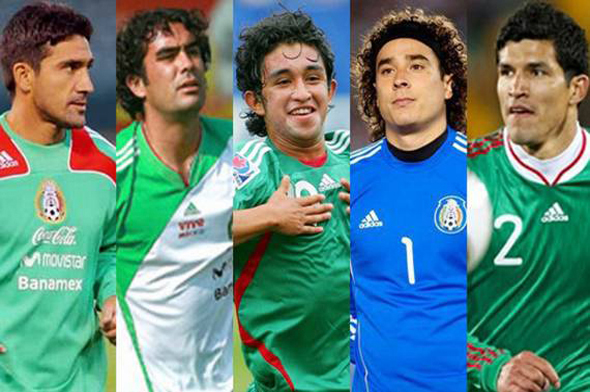By Andrew Warshaw
November 25 – FIFA’s medical chief, Jirí Dvorák (pictured), has called on anti-doping authorities not to take too hard a line against clenbuterol and to be more understanding about how and why the substance gets into the body.
Last month, the World Anti-Doping Agency (WADA) performed a U-turn by abandoning its appeal to the Court of Arbitration for Sport (CAS) against FIFA’s refusal to punish five Mexican footballers who had tested positive for clenbuterol prior to the CONCACAF Gold Cup.
Antônio Naelson, Christian Bermúdez, Édgar Dueñas, Francisco Javier Rodríguez and Guillermo Ochoa (pictured below) were sent home by Mexico after they were found to have failed a drugs test at a training camp.
It was later discovered by the Mexican Football Federation (FMF) that they tested positive as a result of eating chicken contaminated with clenbuterol.
Mexico eventually won the tournament, beating hosts United States 4-2 in the final after having trailed by two, but FIFA took no action over the banished players.
Traces of clenbuterol also showed up in the urine samples of more than 100 players from various countries tested at the FIFA Under-17 World Cup in Mexico this summer after eating contaminated meat.
Although clenbuterol remains on the WADA banned list, FIFA’s chief medical officer Dvorák says what happened at the Gold Cup and Under-17 World Cup proved that greater scrutiny was required about the drug – and not just in football.

“I have asked WADA to look retrospectively at all clenbuterol cases in 2010-11,” Dvorák said in an interview.
“We have to make sure we have had no false positives.
“We are talking about all sports — not just football.”
A WADA statement after its U-turn stressed that clenbuterol “remains a prohibited substance and WADA will approach and study any positive case on an individual basis”.
But Dvorák said: “I have very strong opinions about this.
“It became obvious in Mexico that meat was contaminated.
“The government admitted it and in fact more than half the samples taken showed this to be the case.
“This cannot be systematic doping.
“Remember we are talking about an under 17 tournament.”
The Mexican team’s avoidance of meat at the event — they tested negative throughout — strengthened this argument, he said.
“The coach was so scared he ordered a vegetarian diet so as not to run into the same problem,” Dvorák added.
Dvorák declined to address the specific case of 2010 Tour de France winner Alberto Contador (pictured), whose long-running clenbuterol case has reached the CAS.

Contador has argued since day one that traces of clenbuterol entered his system while eating steaks brought in from Spain.
“I can’t comment on individual cases outside football but maybe it’s a much larger problem than we realise,” said Dvorák.
“Are Mexico and China the only countries where this is an issue?”
Speaking after addressing the Sport, Exercise and Medicine conference in London, Dvorák conversely warned against athletes using traditional Chinese alternative medicines under the assumption they were harmless.
North Korean officials blamed traditional medicine using musk deer glands for five of their players testing positive for steroids at the Women’s World Cup and Dvorák said analysis showed up no fewer than 16 different anabolic steroids.
“A few years ago we had a big issue with prominent footballers testing positive for nandrolone in nutritional supplements,” Dvorák said.
“We issued a strong warning at the time about being careful with what you take and the warning is the same now.
“These Chinese medicines have been used for hundreds of years but the positive findings at the Women’s World Cup was a new experience for us.”
Contact the writer of this story at zib.l1745176391labto1745176391ofdlr1745176391owedi1745176391sni@w1745176391ahsra1745176391w.wer1745176391dna1745176391
Related stories
October 2011: More than 100 players test positive at World Cup
October 2011: FIFA welcome WADA decision to drop appeal over five Mexico players
June 2011: Banned Mexico players pass new drugs tests
June 2011: Five Mexico players sent home after failing drugs test

